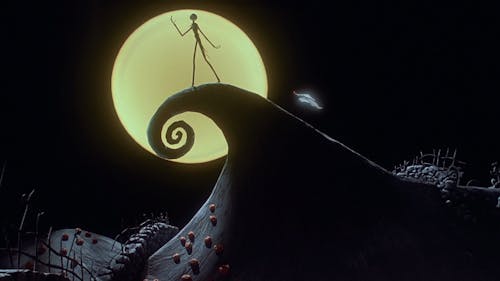'The Nightmare Before Christmas' could reflect bigger truths about cultural appropriation

Halloween has come and gone, and as we all begin our annual tradition of ignoring the Thanksgiving season to instead rush head-first into Christmas, you may find yourself wanting to revisit some festive classics in order to prepare for the holiday season.
Depending on your social circle, using “Merry Christmas” or “Happy Holidays” as your seasonal greeting would make the difference between keeping friends or converting them into enemies. Thankfully, one movie that works regardless of which side of the debate you fall on is Tim Burton’s perennial favorite: “The Nightmare Before Christmas."
For the uninitiated, "The Nightmare Before Christmas" follows the misadventures of Jack Skellington. He's the leader of Halloween Town, a mystical land separate from the real world, whose sole existence is hinged on spending 364 days preparing for its annual Halloween celebration.
Jack has grown bored of Halloween. It's all he's ever known, and he yearns for a new sensation. When he finds a group of differently themed holiday doors while walking through the woods, he stumbles into Christmas Town, and immediately becomes enamored by its bright lights and festive cheer, directly opposed to Halloween Town's moodily colored morbidity.
As many Christmas special protagonists often do, Jack then strives to find the season’s true meaning — before ultimately deciding to make his own version of Christmas when his previous attempts to understand it end in failure.
It's an absolute classic through and through, as well as one of my personal year-end favorites. But on my most recent rewatch, I noticed something new about the story.
It happened during the song "Jack’s Obsession," the point in the story when Jack’s on his last nerve trying to logically explain Christmas, before resorting to making his own, with the line “There’s no reason I can find/I couldn’t handle Christmas time/I bet I could improve it too/and that’s exactly what I’ll do.”
When Jack misunderstands Christmas and attempts to create his own version of the holiday in a more Halloween style, isn’t that just cultural appropriation? I thought more about it and figured … yeah, it kind of is.
Before proceeding, I’d like to establish a working definition of "cultural appropriation" on which I’ll be basing my argument. Cultural appropriation can be described as "the act of taking or using things from a culture that is not your own, especially without showing that you understand or respect this culture," according to the Cambridge English Dictionary.
Given this definition, the comparison to cultural appropriation is evident. Using the holidays as stand-ins for different cultures, Jack was (presumably) born into Halloween culture. It’s all he’s ever known, and when he’s exposed to Christmas culture, he instantly takes to it. When he can’t immediately understand it from his Halloween background, he decides to mangle it to fit a form he’s more familiar with.
This practice is seen in the real world today, too. Cinco de Mayo is a holiday to celebrate Mexico’s victory over the French in the Battle of Puebla in 1862, but today is seen by many in the U.S. as little more than an excuse to get wasted off tequila and down as many tacos as they can.
Likewise, Saint Patrick was a figure so shrouded in mystery, nobody even knows where exactly he was born. The holiday is meant to commemorate his death, yet I guarantee you his impact on Christianity is the last thing on anybody’s mind when they’re four Guinnesses deep at the bar, adorned in their shamrock green clothing and probably not even eating corned beef and cabbage.
This opens up an entirely new debate about whether those from different cultural backgrounds should participate in the holiday traditions of others — but that would be a hopefully better-researched article for a different day.
In Jack's defense, he seemed to only have good intentions. His love for Christmas came from a place of genuine excitement over the new holiday, and his ultimate decision to make his own was born from the frustration of not being able to understand his own feelings.
Still, it's an interesting perspective on a holiday classic, no?



